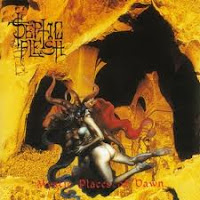I always find myself at odds with the avantgarde genre; it often seems that a band or album is stuck with this label if people are too lazy to figure out what music it really is. On other occasions, it's utilized by the rabid fanbase of a band or the group itself as a pretentious title to elevate the material to a self-fabricated level of importance. I would view Unexpect as your typically adored, excessively overrated example. The result is usually a random, ill-advised mixing of genres with little thought or effort put into the actual songwriting. One-man project Thy Catafalque, however, defies avantgarde conventions by meshing together perfectly. Rengeteg ('a vast forest') is a delectable homogeneous mixture of varying--but all equally tasty--components.
At its heart, Rengeteg is a simple meshing of post-black metal and folk music (the vocals, in particular, are deeply rooted in the latter). Other elements are subtle enough so as not to be distracting. Little electronic elements and distorted spoken word parts are sprinkled sparingly, most notably in an intense section of fourteen minute epic "Vashegyek." Creeping forth with a soft, lovely intro complemented by female vocals, this track soon bursts into a repetitive onslaught of droning rhythms and synthesized sounds, the latter of which you might find in the likes of 70s Deep Purple. Opener "Fekete mezők," possibly my favorite here, is a stunner, beginning with a surprisingly crushing death metal riff and segueing into agonizing harsh vocals. The powerful and wonderfully sang chorus just tops it off, proving avantgarde can be as catchy as it is daring and assuring that its nine minute runtime never becomes boring.
The other tracks are simpler and shorter but no less beautiful. They often take one idea and run with it, featuring little deviation from the original structure, but with this quality, why would anyone want the formula to change? The brief "Trilobita," an upbeat folk flurry of lights and colors, reflects the nature of Rengeteg as a whole; this is a largely optimistic musical journey. Whereas a band like Alcest or Les Discrets would dwell on sadness and the times we've passed by, Thy Catafalque celebrates the present, the promise of the future, and the wide scope of possibilities still to come. It's a diverse yet compellingly consistent work that not everyone will connect to; yep, it's avantgarde that works. Now comes the part when I use the dreaded term 'art' metal. Deal with it, because this belongs right alongside Enslaved's later discography even if it doesn't quite reach that band's greatest heights. Buy now.
Overall: 9.25/10 (Outstanding)
At its heart, Rengeteg is a simple meshing of post-black metal and folk music (the vocals, in particular, are deeply rooted in the latter). Other elements are subtle enough so as not to be distracting. Little electronic elements and distorted spoken word parts are sprinkled sparingly, most notably in an intense section of fourteen minute epic "Vashegyek." Creeping forth with a soft, lovely intro complemented by female vocals, this track soon bursts into a repetitive onslaught of droning rhythms and synthesized sounds, the latter of which you might find in the likes of 70s Deep Purple. Opener "Fekete mezők," possibly my favorite here, is a stunner, beginning with a surprisingly crushing death metal riff and segueing into agonizing harsh vocals. The powerful and wonderfully sang chorus just tops it off, proving avantgarde can be as catchy as it is daring and assuring that its nine minute runtime never becomes boring.
The other tracks are simpler and shorter but no less beautiful. They often take one idea and run with it, featuring little deviation from the original structure, but with this quality, why would anyone want the formula to change? The brief "Trilobita," an upbeat folk flurry of lights and colors, reflects the nature of Rengeteg as a whole; this is a largely optimistic musical journey. Whereas a band like Alcest or Les Discrets would dwell on sadness and the times we've passed by, Thy Catafalque celebrates the present, the promise of the future, and the wide scope of possibilities still to come. It's a diverse yet compellingly consistent work that not everyone will connect to; yep, it's avantgarde that works. Now comes the part when I use the dreaded term 'art' metal. Deal with it, because this belongs right alongside Enslaved's later discography even if it doesn't quite reach that band's greatest heights. Buy now.
Overall: 9.25/10 (Outstanding)






















